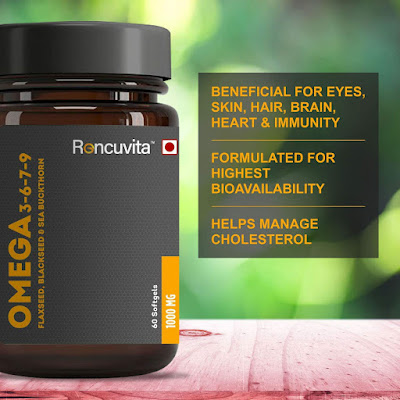Omega 3 6 7 9 flax seeds is a comprehensive nutritional
omega complex derived from a balanced blend of fish oil, sea buckthorn oil,
flaxseed oil and borage oil.
Fish oil is a natural source of omega-3 essential fatty
acids (EFAs), including eicosapentaenoic acid (EPA) and docosahexaenoic acid
(DHA).
EFAs cannot be produced by the body and can only be obtained
through diet and supplementation.
EFAs are important structural components that make up cell
membranes.
EFAs play a vital role in supporting the proper functioning
of every cell in the body.
Sea buckthorn oil is loaded with
omega-7 fatty acid (palmitoleic acid) commonly used to nourish the body.
Omega-7 fatty acid is present in the matrix of the skin,
blood vessels, and protective mucous membranes throughout the body.
Supercritical carbon dioxide extraction delivers the
beneficial components of sea buckthorn under extremely gentle conditions in a
low heat and oxygen environment.
Flaxseed oil helps support a healthy body.
The borage oil and flaxseed oil are cold pressed to preserve
most of their nutritional values.
Recommended for individuals who wish to maintain good health.
At Roncuvita, we are proud to offer a wide collection of
omega oils, which are filled with essential fatty acids (EFAs). Our bodies need
EFAs in order to maintain good health, however, our bodies cannot manufacture
EFA's themselves, and so Omega
3 6 7 9 Flax seeds oil supplements are a convenient way to complement your
diet.
Our extensive collection of omega and fish oils provides a
comprehensive range, including omega 3, 6, 7, and 9. These offer a range of
benefits, for example, Omega 3 DHA offers support for the normal functioning of
the heart, brain and vision. For more products to support your wellbeing,
explore our range of multivitamins and minerals available.
At Natures Aid, we are proud to offer an omega range which
is one of the most comprehensive ranges in the UK and includes omega 3, 6, 7
and 9, with organic, vegetarian and vegan options. Our omega oils products
offer a range of benefits, such as support for the normal functioning of the
heart, brain and vision from Omega 3 DHA.
Omega Oils
Omega oil supplements provide a convenient way to complement
your diet with essential fatty acids (EFAs). EFAs are fats which the human body
needs to maintain good health, but cannot be manufactured naturally by it.
Because of this, we need to consume them either via the diet or by
supplementation. Ingredients in our omega supplements are 100% naturally
sourced for all over the world, and undergo a rigorous testing procedure in our
UK laboratory, to ensure they provide the best absorption and bioavailability.
Omega Oils at Natures Aid
Shop our full collection of omega oils available from
RONCUVITA today, and benefit from essential nutrients your body needs.
Available in a range of capsule and liquid options, there are omega and omega 3 fish oil products suitable
for all. Explore a range of vitamin supplements now for more. At Roncuvita, we
are proud to offer a wide collection of omega oils

